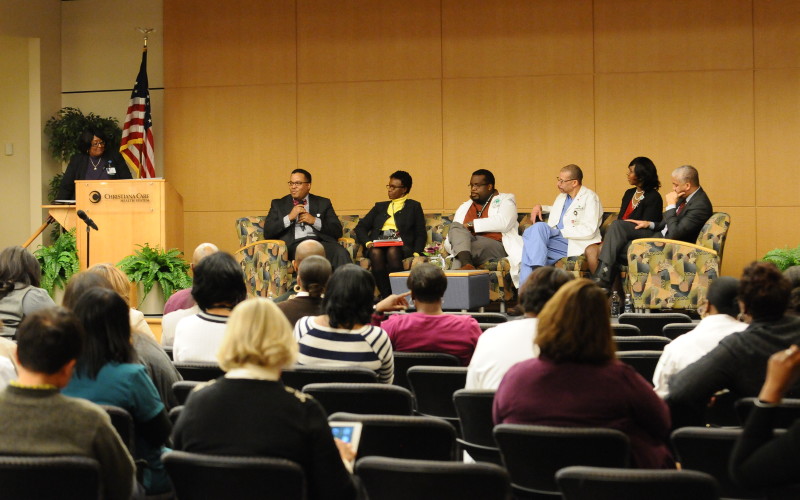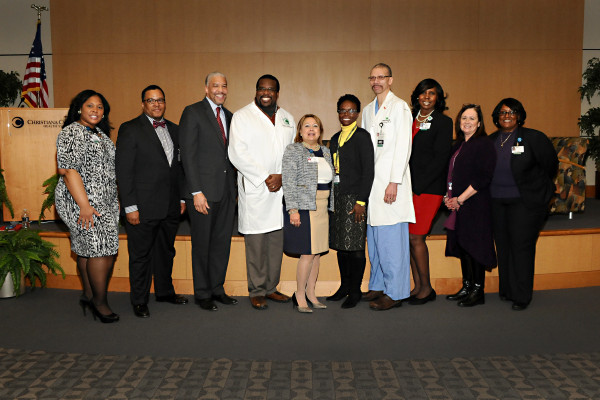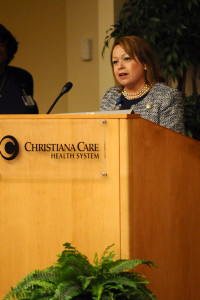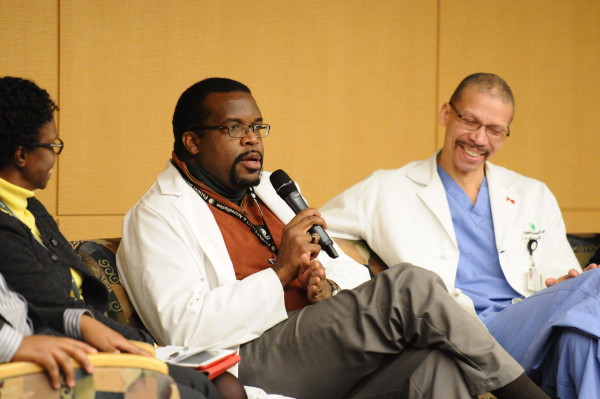Christiana Care leaders share career reflections in Black History Month panel

Velma P. Scantlebury, M.D., was in fellowship training at the University of Pittsburgh in the 1980s when she taped a three-word note to her bathroom mirror that read: “YES, I CAN.”
To overcome obstacles of gender and race and get to “YES,” Dr. Scantlebury set clear goals for herself. She benefited from mentors. And throughout her journey, she asked herself an essential question: “Is this the best I can do?”

Today, she is the nation’s first African-American female transplant surgeon and associate chief of Transplant Surgery at Christiana Care.
It is inspiring to see someone who looks like me talk about what it takes to be successful. I learned that I need to be more aggressive in finding a mentor.
“You need to think about long-term goals and set timelines to achieve those goals,” she said.
In celebration of Black History Month, Dr. Scantlebury and five other successful African-Americans at Christiana Care Health System offered insights on advancement in a panel discussion, “The Currency of Your Career: Understanding What is Needed (Education, Skills, Networks) to Progress to Your Desired Career.” Christiana Care’s Multicultural Heritage Committee hosted the event on Feb. 24 at the John H. Ammon Education Center.

“This is a very special day at Christiana Care as we celebrate Black History Month for the first time,” said Rosa M. Colon-Kolacko, Ph.D., MBA, CDM, senior vice president, Christiana Care Learning Institute, and chief diversity officer. “This event is a wonderful opportunity to learn from each other, promote diversity and inclusion, and advance The Christiana Care Way.”
Edmondo J. Robinson, M.D., MBA, FACP, senior vice president and executive director of Christiana Care – Wilmington and associate chief medical officer, was born to a teenage mother, who earned her nursing degree when he was in college. He was inspired by his uncle, a photographer and entrepreneur, to study hard and look for educational opportunities.
“I don’t believe in serendipity. You make your own opportunities,” Dr. Robinson said. “You don’t sit around and wait for success to drop out of the sky. You need to have that internal motivation and drive.”
Cardiac surgeon Ray Blackwell, M.D., left home at 16 and participated in A Better Chance Program while in a Connecticut high school. The experience transformed his life. He went on to Dartmouth College and Medical School and today is a distinguished surgeon.
“If you are in a system that doesn’t work very well, you have to look for other opportunities,” Dr. Blackwell said. “Don’t let anyone take your dreams.”

Kimberly Talley, MSN, RN, CRNP, CNML-BC, FABC, loved working as a bedside nurse. Mentors who recognized her ability to motivate others encouraged her to take leadership classes. Their guidance and advice helped her on her path to becoming vice president, Patient Care Services, Surgical.
“Make sure your most important mentor is someone who is honest with you,” Talley said.
Eric V. Jackson Jr., M.D., MBA, the son of college-educated parents, one of whom is an emeritus professor at the University of the District of Columbia, in Washington, D.C., grew up surrounded by successful middle-class African-American families. He said the most effective way to climb the career ladder is to perform your best each step of the way up so you will be ready for the next opportunity.
“Focus on being excellent where you are,” said Dr. Jackson, director of the Center for Health Care Delivery Science and associate director of the Value Institute. “Chance favors the prepared mind.”
LeRoi Hicks, M.D., MPH, vice chair, Department of Medicine, said establishing a reputation for integrity and respect helps to position career-minded individuals for advancement.
“Finish what you start. Be good to people,” he said. “Be fully confident in your own ability to succeed.”
A professor who believed in him opened his eyes to the possibilities when he began exploring opportunities for fellowships.
“He said, ‘why haven’t you looked at a place like Harvard?’” recalled Dr. Hicks, who ultimately completed a fellowship in internal medicine and a master’s degree in public health at Harvard Medical School.
The panel discussion was open to all Christiana Care employees. It was moderated by Dana Beckton, director, Diversity and Inclusion/Employee Development.
Focus on being excellent where you are. Chance favors the prepared mind.
Melva Lane, BSN, MBA, RN-BC, nurse manager on 4W, said, “It is inspiring to see someone who looks like me talk about what it takes to be successful. I learned that I need to be more aggressive in finding a mentor.”
Gail Blandford, RN, came on her day off to learn from the panelists. She was inspired to establish a three-year plan. “I need to get a good idea of what my goals are,” she said.
The panel discussion also resonated with Christiana Care employees listening remotely at Wilmington Hospital, who sent comments via smartphones and tablets through the Train-by-Cell program.
“The level of pride that I feel right now sitting in this auditorium among all of my colleagues is absolutely indescribable,” said one audience member via Train-by-Cell. “Thank you to each of you for your example, your inspiration and sharing your stories. My prayer is that we will all use this experience today as a catalyst to be an example for others.”